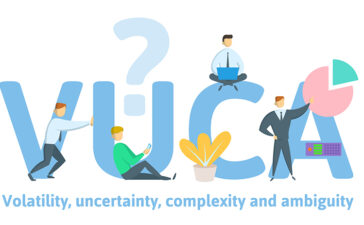EQ in HR
That EQ has started to find a central position in the corporate narrative over the last decade is indisputable. However, we are still scratching the surface when it comes to its adoption in all aspects of the modern workforce. It is yet to take centre stage in entire fields, functions and nations, with many leaders still significantly prioritising traditional intelligence or IQ. The responsibility for permeating EQ as a common practice organisation-wide falls squarely on the shoulders of HR, for which it must first be emotionally empowered by itself.
EQ is as essential to HR as HR to it. HR as a function has historically always been in the business of practising EQ without formalising it in so many words, and people with a high EQ have gone on to become pioneers in the field. The corporate landscape of today is more complex and unpredictable than it has ever been before, with a global pandemic just one of the many paradigm shifts today’s white-collar worker is going through. Shorter careers, international intermingling, cross-functional competence, work-life (im)balance, and disruption due to technology have turned traditional decision making on its head. The one constant enabling us to deal with the changes in this ever-shifting flipbook is our emotional acumen. Disruptive change will only accelerate with time, and the modern employee must embrace instead of resisting this change to be successful and happy. This can only be done if one is first cognizant and in control of their thoughts and emotions, alongside acknowledging and then respecting those of others around them.
How to promote EQ
Among all the drastic changes employees have to adapt to, this is arguably the most sweeping and takes a lot more than learning a skill off the internet or on the job and then applying it. Becoming emotionally competent involves thorough introspection and a conscious effort to understand the pain points of the people whose lives you touch every day. Simultaneously understanding yourself and those around you while hustling in a high-pressure environment is as challenging as it sounds, and this is where HR comes in. As the custodian of employee welfare and upliftment, HR personnel must set the tone in promoting EQ in the workplace by not just spreading awareness about it, but by practising its principles at all times to set an example for their fellow co-workers. Like many other skills, empathy and sensitivity are best imbibed by engaging in situations where they are needed, and it is the foremost duty of HR to lead the way by demonstrating these values in their everyday interactions.
Be it a conversation over coffee or a strategy conference, HR personnel should unwaveringly abide by the tenets of EQ such that they form a regular part of their psyche. Apart from inculcating EQ in the organisation, HR workers also need to boast high levels of emotional intelligence to be able to earnestly understand the grievances of their fellow employees, while keeping their own emotions in check. This is so that employees do not hesitate to approach them, as well as to provide redressals to their problems. It is important to note that practising EQ does not simply mean behaving pleasantly in every situation; it is in fact the exact opposite. EQ involves regulating one’s emotions to accurately interpret the situation one is presented with, then responding to it appropriately. While being harsh should certainly not be viewed as the first resort, it still is one.
Changing role of HR
In fact, the role of HR in being the cornerstone of EQ goes beyond just interactions and encompasses all aspects of their responsibilities. It is essentially the level of EQ in an organisation that dictates its culture, which HR is instrumental in defining and consistently maintaining. HR lays down the code of conduct for all employees in the organisation and embodies it in practice. The principles behind this code are based entirely on (varying levels of) EQ, and an emotionally intelligent HR would correspondingly create a more conducive work culture for current and future employees. A happy and valued workforce is also a productive one, while vice versa may not always be true, and it is the HR’s role to discern when employees are only productive and not happy. In a culture where EQ is given its due, the common practices arising out of the culture would ensure that the minimal problems in employee welfare are quickly identified and corrected.
The modern workplace also demands other aspects of HR responsibilities to be guided by EQ. While designing organisational structures, flatter hierarchies with ease of reporting are proliferating organisations looking to bolster communication speed and employee relationships. The traditional “boss – junior” relationship is fast being replaced by one where distinctions exist only in the scope of responsibilities, with an increased focus on two–way learning. Quality of work experience is prioritised over its quantity, with age no longer viewed as a guarantee of knowledge. Similarly, compensation structures and employee benefits are formulated keeping in mind the changing nature of expectations and providing competitive wages which are standardised for a particular level and not varied for different durations of work experience for a common role.
Conclusion
What a company is to its clients, HR is to prospective employees. Since HR is chiefly responsible for employer branding, the standards of EQ in the form of employee commitment shown by an organisation would reflect in its culture. The first engagement of a candidate with a firm is usually with HR, who thereby represent the first and most important impression of everything the company stands for. While every company glorifies itself on any media, it is the initial interactions with HR that genuinely communicate to a potential employee what he/she can expect from them culturally. With people prioritising happiness and contentment in their corporate stints, a high standard of EQ displayed by HR can speak volumes about the company’s culture, thereby aiding in attracting top talent.
With the internet diminishing the importance of IQ, it is EQ that separates the best organisations from the rest. Intellectually property is no longer the beacon of an organisation’s competitiveness in the job market; it has been replaced by culture defined by emotional intelligence. The role of HR in setting the standard for this change is arguably its most important one, and should jump to the top of job descriptions designed by the HR managers of tomorrow!
















